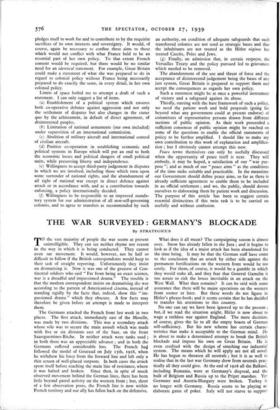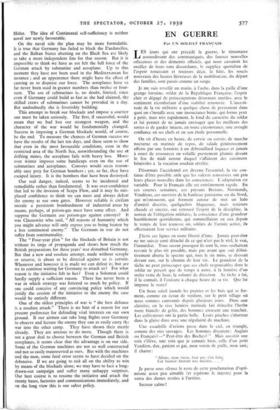THE WAR SURVEYED : GERMANY'S BLOCKADE
By STRATEGICUS
TO the vast majority of people the war seems at present unintelligible. They can see neither rhyme nor reason in the way in which it is being conducted. They cannot even see movement. It would, however, not be half so difficult to follow if the British correspondents would keep to their task of straight reporting. Unfortunately they insist on dramatising it. Now it was one of the greatest of Con- tinental soldiers who said " Far from being an exact science, war is a dreadful and impassioned drama." The trouble is that the modern correspondent insists on dramatising the war according to the pattern of Americanised cinema, instead of standing rigidly by the facts that, indeed, show this " im- passioned drama " which they obscure. A few facts may therefore be given before an attempt is made to interpret them.
The Germans attacked the French front last week in two places. The first attack, immediately east of the Moselle, was made by two divisions. This was a secondary attack whose role was to secure the main assault which was made with five or six divisions east of the Saar, on the front Saareguemines-Bitche. In neither attack were tanks used ; in both there was an appreciable advance ; and in both the Germans suffered considerable loss. The French hacj followed the model of Gouraud on July r5th, 1918, when he withdrew his force from the forward line and left only a thin screen of well-placed outposts. In both cases the attack spent itself before reaching the main line of resistance, where it was halted and broken. Since then, in spite of much observed movement behind the German lines, there has been little beyond patrol activity on the western front ; but, short of a few observation posts, the French line is now within French territory and our ally has fallen back on the defensive. What does it all mean? The campaigning season is almost over. Snow has already fallen in the Jura ; and it begins to look as if the idea of a major attack has been abandoned for the time being. It may be that the German staff have come to the conclusion that an attack by either side against the permanent fortifications on the western front would be too costly. For them, of course, it would be a gamble in which they would stake all, and they fear that General Gamelin is too, astute to risk the losses inevitable in an attack on the West Wall. What then remains? It can be said with some assurance that there will be major operations on the western front sooner or later. But these words do not figure in Hitler's phrase-book; and it seems certain that he has decided to transfer his attentions to this country.
No one can say we have been ignored up to the present ; but, if we read the situation aright, Hitler is now about to wage a ruthless war against England. The mere decision, of course, gives the lie to all the empty boasts of German self-sufficiency. But his new scheme has certain charac- teristics that make it acceptable to the German mind. He is about to make a determined attempt to break the British blockade and impose his own on Great Britain. He is even credited with the design of smashing our industrial system. The means which he will apply are not all novel. He has begun to threaten all neutrals ; but it is as well to realise that in the last war Germany drew from neutrals prac- tically all they could give. At the end of 1916 all the Balkans, including Rumania, were at Germany's disposal, and the bulk of Belgium and Russia up to the Pripet marshes. Yet Germany and Austria-Hungary were broken. Turkey is no longer with Germany. Russia seems to be playing an elaborate game of poker. Italy will not starve to support Hitler. The idea of Continental self-sufficiency is neither novel nor newly favourable.
On the naval side the plan may be more formidable. It is true that Germany has failed to block the Dardanelles, and the Balkan States abutting on the Black Sea are likely to take a more independent line for that reason. But it is impossible to think we have as yet felt the full force of the German attack by submarine and aeroplane. Up to this moment they have not been used in the Mediterranean for instance ; and an appearance there might have the effect of causing us to disperse our force. The aeroplanes have so far never been used in greater numbers than twelve or four- teen. The use of submarines is, no doubt, limited, since even if Germany could build as fast as she had claimed, the skilled crews of submarines cannot be provided in a day. But undoubtedly she is feverishly building.
This attempt to break our blockade and impose a counter one must be taken seriously. The first, if successful, would mean that we had lost our strongest weapon, and the character of the war would be fundamentally changed. Success in imposing a German blockade would, of course, be the end. To measure the chances of German success we have the results of the last ten days, and these seem to show that even in the most favourable conditions, even in the restricted area of the North Sea, notwithstanding the use or drifting mines, the aeroplane fails with heavy loss. More- over winter imposes some handicaps even on the use of submarines and aeroplanes. Convoys would seem reason- ably easy prey for German bombers ; yet, so far, they have escaped injury. It is the bombers that have been destroyed.
Our real danger, indeed, seems to be incidental and remediable rather than fundamental. It was over-confidence that led to the invasion of Scapa Flow, and it may be mis- placed confidence to think we can meet and always defeat the enemy at our own gates. However reliable is civilian morale a persistent bombardment of industrial areas by means, perhaps, of poison-gas must have some effect. And suppose the Germans use poison-gas against convoys? It was Clausewitz who said, " All reasons of humanity which you might advance will only expose you to being beaten by a less sentimental enemy." The Germans in war do not suffer from sentimentality.
The " Four-year plan " for the blockade of Britain is not without its tinge of propaganda and shows how much the British preparations for three years' war disturbed Germany. But that a new and resolute attempt, made without scruple or reserve, is about to be directed against us is certain. Whenever and however it is made we can defeat it; but are we to continue waiting for Germany to attack us? For what reason is the initiative left to her? Even a Solomon could hardly supply a sufficient reason. There has never been a war in which strategy was fettered so much by policy. If one could conceive of any convincing policy which would justify the cession of the initiative to the enemy the case would be entirely different.
One of the oldest principles of war is " the best defence is a resolute attack." There is no hint of a reason for our present preference for defending vital interests on our own ground. If our airmen can take long flights over Germany to observe and lecture the enemy they can as easily carry the war into the other camp. They have shown their mettle already. They are anxious to do more. Though there is not a great deal to choose between the German and British aeroplanes, it seems clear that the advantage is on our side. Some of the German machines are not so well constructed and not so easily manoeuvred as ours. But with the machines and the men, some fatal error seems to have decided on the defensive. If we are going to risk all on the ability to win by means of the blockade alone, we may have to face a long- drawn-out campaign and suffer many unhappy surprises. Our best course is to resume the initiative and attack the enemy bases, factories and communications immediately, and on the long view this is our safest policy.









































 Previous page
Previous page